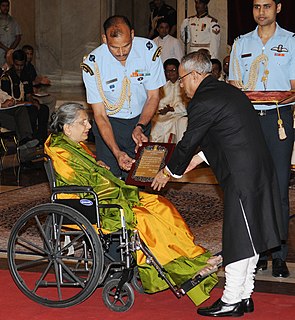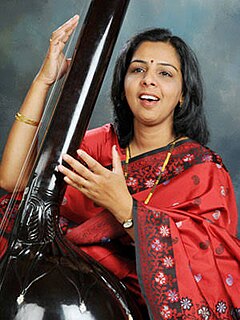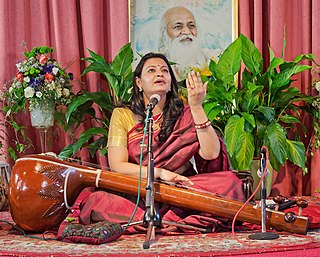Related Research Articles

Hindustani classical music is the classical music of northern regions of the Indian subcontinent. It may also be called North Indian classical music or, in Hindustani, Shastriya Sangeet. Its origins date from the 12th century CE, when it diverged from Carnatic music, the classical tradition of southern regions of the Indian subcontinent.
In Hindustani music, a gharānā is a system of social organisation in the Indian subcontinent, linking musicians or dancers by lineage or apprenticeship, and more importantly by adherence to a particular musical style.

The Mewati gharana is a musical apprenticeship tribe of Hindustani classical music. Known for being Pandit Jasraj's musical lineage, the gharana was founded by brothers Utd. Ghagge Nazir Khan and Utd. Wahid Khan (beenkar) of Indore in the late 19th century at the Holkar Court. Members of this gharana have had an active influence in Indian cinema for over half a century.

Veena Sahasrabuddhe was a leading Indian vocalist and composer of Hindustani classical music from Kanpur. Her singing style had its roots in Gwalior gharana, but it also borrowed from Jaipur and Kirana gharanas. Sahasrabuddhe was known as a singer of khyal and bhajan.

Ramesh Narayan is an Indian classical vocalist, composer and music producer who works predominantly in Malayalam cinema. He belongs to the Mewati gharana of Hindustani classical music. Narayan began his initial training in Carnatic music and later mastered the classical Hindustani style under the renowned Pandit Jasraj.
The Gwalior Gharana is one of the oldest Khyal Gharana in Indian classical music. The rise of the Gwalior Gharana started with the reign of the Mughal emperor Akbar (1542–1605).
Bhaskar Raghunath Bakhale was a Hindustani classical vocalist, a composer, and a teacher.
Gandharva Mahavidyalaya New Delhi is an institution established in 1939 to popularize Indian classical music and dance. The Mahavidyalaya (school) came into being to perpetuate the memory of Pandit Vishnu Digambar Paluskar, the great reviver of Hindustani classical music, and to keep up the ideals set down by him. The first Gandharva Mahavidyalaya was established by him on 5 May 1901 at Lahore. The New Delhi school follows the syllabi set by the Akhil Bharatiya Gandharva Mahavidyalaya Mandal.

Damodar Hota is an Indian classical vocalist, musicologist, composer, and guru based in Odisha, India. He is an exponent of Hindustani classical music as well as Odissi classical music.
Chintaman Raghunath Vyas, popularly known as C. R. Vyas, was an Indian classical singer. He was known for singing khyal style.
Padma Talwalkar is an Indian classical vocalist.

Pt. Omkarnath Thakur, was an Indian music teacher, musicologist and Hindustani classical singer. A disciple of classical singer Vishnu Digambar Paluskar of Gwalior gharana, he became the principal of Gandharva Mahavidyalaya, Lahore, and later went on become the first dean of the music faculty at Banaras Hindu University.He also wrote book "sangeetanjli" vol 1 to 6
Ramchandra Purushottam Marathe, also known as Pandit Ram Marathe, was a Marathi music director, singer, and actor on stage and in films. As a child actor, he performed the title role of Krishna in Prabhat Film Company's 1938 film, Gopal Krishna. He was disciple of Vilayat Hussain Khan, the maestro of Agra gharana of Hindustani classical music., Master Krishnarao Phulambrikar and others. Through Master krishnarao, he developed his Khayal style which had elements of different gharanas such as Jaipur, Gwalior and Agra.

Manjusha Kulkarni-Patil is a Hindustani classical music vocalist. She belongs to the Gwalior gharana.

Vishwanath Jadhav (1885−1964) was an Indian classical khyal singer and a disciple of Abdul Karim Khan, the founder of Kirana gharana.
Professor B. R. Deodhar was an Indian classical singer, musicologist and music educator. He was a vocalist of Khayal-genre of Hindustani classical music.

Dr. Meeta Pandit is a Hindustani Classical vocalist and a leading exponent of the Gwalior Gharana. She is the granddaughter and disciple of Krishnarao Shankar Pandit and daughter of Laxman Krishnarao Pandit. She is the sixth in the unbroken lineage and the first woman in the family to have taken up music as a profession.
Krishnarao Shankar Pandit (1893–1989) was an Indian musician, considered by many as one of the leading vocalists of the Gwalior gharana. He authored several articles and 8 books on music and was the founder of Shankar Gandharva Mahavidyalaya, a music college based in Gwalior. The Government of India awarded him the third highest civilian honour of the Padma Bhushan, in 1973, for his contributions to music. He was also a recipient of several other honors, including the 1959 Sangeet Natak Akademi Award and the 1980 Tansen Award of the Government of Madhya Pradesh.
Pandit Damodar Keshav Datar, popular as D. K. Datar, was an Indian violinist. He was born in Kurundwad, Kolhapur district, Maharashtra. His brother Narayanrao introduced him to music and he took early lessons in violin from Pandit Vighneshwar Shastri, who used to teach at the Deodhar School of Indian Music, Mumbai. Datar completed his Bachelor's Degree but took music as full time profession. He was nephew of Hindustani classical vocalist D. V. Paluskar, under whom he later on studied music. Influenced by Paluskar, Datar adjusted his violin playing technique to vocal dominated style and played violin according to the khyal style of Gwalior gharana. Apart from khyal, he popularly also played on bhajan, thumri and natya sangeet styles. Among various countries, he toured Europe, the United States, Canada, and Japan. He was also employed by Films Division of India and regularly provided background score for various documentary films. He received Sangeet Natak Akademi Award in Hindustani Music in 1995 and in 2004 was conferred with Padma Shri, India's 4th highest civilian honour. he died on 10 October 2018 of old age at his residing home in Goregaon, Mumbai.
Vinayak Ramchandra Athavale, better known as V. R. Athavale or Vi. Ra. Athavale, was a Hindustani classical vocalist and one of the foremost Hindustani classical musicologists of the 20th Century, alongside Vamanrao Deshpande and Sharadchandra Arolkar. He composed using the pen name "Naad Piya". He is known for his critique of traditional ideas and modern aesthetics. He was trained primarily by Vinayakrao Patwardhan and Vilayat Hussain Khan and is considered a representative of Gwalior and Agra traditions.
References
Vijaya Ghose. (1999:222). Limca Book of Records.
(1999:493). Indo American Who's Who Vol II. New Delhi: FI Publication.
(1986:143). Reference Asia Vol II. New Delhi: Rifacimento Organisation.
(1996:524). Indo European Who's Who Vol I. New Delhi: FI Publication.
(1992:810). Biography International Vol III and Vol IV. New Delhi: South Asia Publication Company.